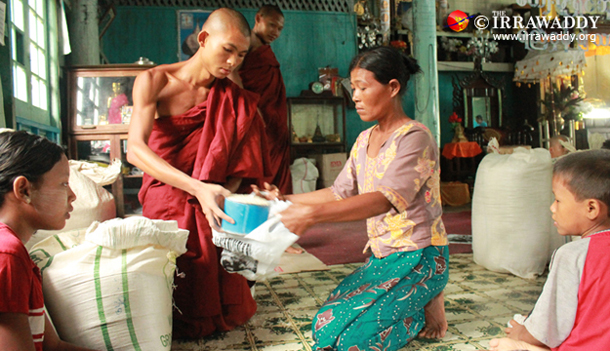Several Arakanese Buddhist monks are boycotting aid from international agencies and NGOs, accusing them of bias in their distribution.
Speaking to The Irrawaddy on Friday, Venerable Manisara, an abbot who heads a local aid group in Maungdaw in northern Arakan State, said, “The foreign NGOs have only given a minimal amount to our Rakhine [Arakanese] people, but they give a lot to the Bengalis [Rohingyas]. It is not fair and is unacceptable. We cannot trust them and that’s why we must reject their aid.”
Similarly, in Buthidaung and Rathedaung townships, Arakanese Buddhist monks who are helping to shelter displaced Buddhist villagers, said that they too will no longer accept any foreign aid. One monk said that none of the 10 or so international agencies, including the UN groups, in the townships have visited Buddhist monasteries as “they already know that we will reject their aid.”
Venerable Manisara accused the UN and other foreign agencies of favoring Muslims, and of providing not only food and humanitarian aid to them, but also funding road construction, irrigation, well-building, education and medical projects only for the Bengali/Rohingya community in Maungdaw Township.
“I have been living in Maungdaw for a decade,” he said. “I do not see the foreign agencies as a benefit to our people. We will rely on aid from inside Burma as we do not trust them.
“We do not want to hear the words ‘minority’ and ‘majority.’ If they [the foreign agencies] are truly non-racist, they would give an equal supply to everyone. We are all human—both Arakanese and Bengali,” said Venerable Manisara.
However, according to San Hla Kyaw, a central committee member from the Rakhine Nationalities Development Party (RNDP) in Sittwe, the capital of Arakan State, the monks’ decision to reject foreign aid does not reflect the majority consensus among those tens of thousands displaced and affected by the month-long sectarian violence.
“I am worried the monks’ decision might not be popular among refugees. It is purely their own personal opinion,” he said, adding that local aid groups in Sittwe will continue to accept foreign aid.
However, San Hla Kyaw echoed Venerable Manisara’s claim that Médecins Sans Frontières, CARE, and UN aid agencies discriminate in favor of the Rohingyas when providing aid to local people in Maungdaw Township.
Meanwhile, state authorities opened a main public market in Sittwe on Thursday for the first time since the violence began, saying the situation was becoming more calm.
However, New York-based Human Rights Watch released a press statement on Thursday saying “local police, the military, and a border security force known as Nasaka have committed numerous abuses in predominantly Muslim townships.”
It urged the Burmese government to “end arbitrary and incommunicado detention, and redeploy and hold accountable security forces implicated in serious abuses.”
Elaine Pearson, the deputy Asia director at Human Rights Watch, said, “The Burmese government needs to put an immediate end to the abusive sweeps by the security forces against Rohingya communities. Anyone being held should be promptly charged or released, and their relatives given access.”
Burma’s security forces have been implicated in killings and other abuses against Muslim civilians since the sectarian violence in northern Arakan State began in early June, said Human Rights Watch, urging the Burmese authorities to ensure safe access to the area to the UN and independent humanitarian organizations.
















